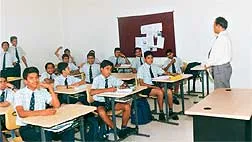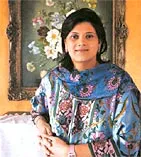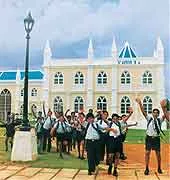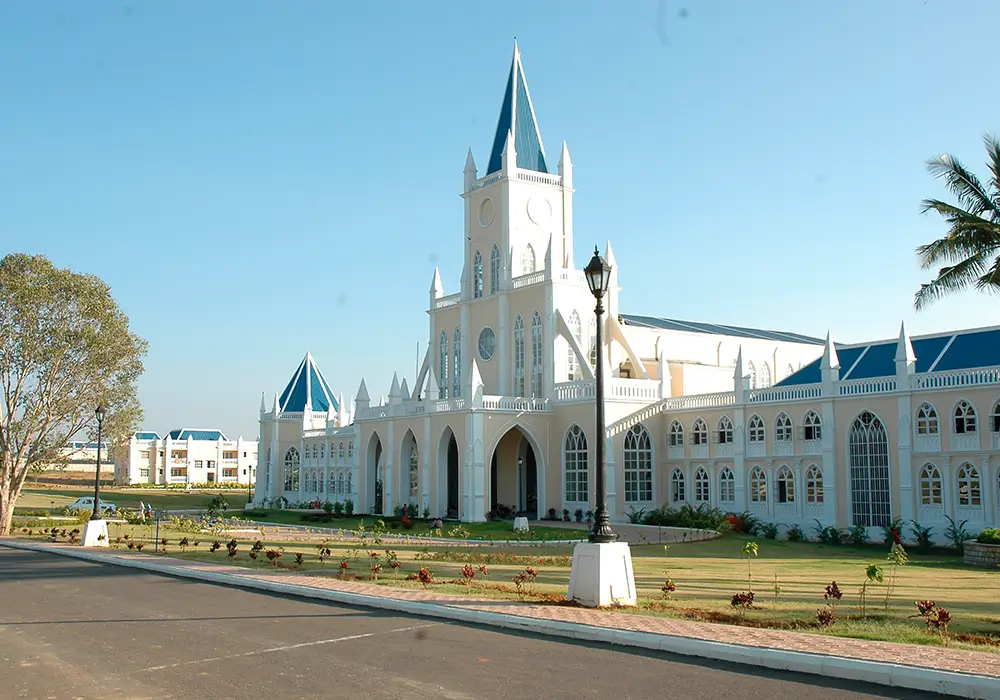The Sarala Birla Academy: A profile
- Copy
By Dr. Pragnya Ram
Group Executive President
Corporate Communications
"The torch passes to a new generation from the Principal and the teachers. This will light their path as they progress through life, tempered as it is by war, proud of our heritage and unwilling to witness or permit the slow undoing of those human rights to which our beloved India has been committed. They will be the leaders of tomorrow.
May all the students who will enter the portals of this Academy be blessed with fulfilment in every way because here, along with the academics, art, culture, music, theatre, and vocational training will form an integral part of the curriculum. To them I say, take full benefit of this temple diligently and make Ma Saraswati proud. Your alma mater will surely bask in your glory." — Dr. Sarala Birla
The Sarala Birla Academy
It''s simply awesome. Whichever way you view it. Meander through its sprawling 67 acre campus. Gaze at its splendidly steepled academic block, and other equally alluring buildings. It transposes you in an instant to the venerable yet delightful portals of the Oxford University.
The spiritual, cerebral and sporty ambience apart, the sound of innocent laughter of more than a 100 kids — like cowbells ringing on a mountain top, can lift your spirits no end.
A contemporary gymnasium, a swimming pool that can more than match the world''s best and an energising sports complex makes it a "dream school".
And the happiest part of the experience is that a majority of the 130 students — of whom more than 120 are first time boarders, feel the same way. Toufeeque, who has joined our School, along with his brother says, "They should do the Harry Potter filming here. It is so beautiful." Kim, a Korean kid, adds, "This School is the best. I simply love it. I think this School is better than all Korean schools."
Aman Jain, an eighth grader seems as smitten, "I enjoy everything. We have wonderful teachers, studies, sports — really super. The food is yummy. Of course, I miss all at my home and my parents most. I have never been away from them. I know they have placed me here because it is best for me. They have put me in the best School."
Rachit, Vatsal, Rohan, Nimit, Rahul, Vishal, Vansh and Harshvardhan echo similar sentiments. At the end of two days, you find almost every one of these prancing, dancing, studying, hogging kids singing the same tune.
And why not?
When Mr. Kumar Mangalam Birla and Mrs. Neerja Birla conceived the School, they were crystal clear that it had to be different. Remarks Mrs. Neerja Birla,"In most Indian schools, students are overburdened with rote learning. Listening and being lectured to is the norm. Many of the schools are not open to questioning, to discourse, to the spirit of discovery and enquiry. There is so much of pressure that in the process, the joy of childhood is lost. This we believe is the greatest risk.
In our view, the entire experience of going to school, of education, of learning, must be one that children eagerly look forward to and are excited about. As Albert Einstein remarked, "...education is not so much the feeding of facts into the mind as the awakening of curiosity in the soul."

Ignite minds
Mr. Birla''s over-arching vision for the Sarala Birla Academy is "to ignite minds and to c;reate in students a love for learning and continuous development, by making the learning process an enjoyable experience. The Academy''s mission is to help each student reach his full potential and by doing so, help develop a higher sense of self-esteem in the student.
The Academy will endeavour to equip its students with life skills that place him first among his equals, when he steps out into the real world. Our strong belief is that education need not be a ''grind'', focused on rote learning. Rather, education ought to be oriented towards developing a fuller person — in body, mind and intellect, a person imbued with a sense of independence, commitment and compassion, a person capable of providing the kind of leadership our society needs."
"The Academy," avers Mr. Birla,"is fortunate to have a team of committed, passionate teachers and staff members, who, I have no doubt, will bring to bear great intellectual and emotional commitment to their responsibilities. I am confident that the Academy will more than meet the expectations of parents in moulding their child into a complete person."
The best of the best
To enlist the crème de la crème of the teaching fraternity, our Chairman invested enormous amount of his time and energy in the s;election of teachers, admirably assisted by Dr. Shyamal Ganguli, our Chief Education Officer and Director of the Academy. Our teachers are drawn from the best Public Schools. Dr. Ganguli himself is from the Doon School, Dehra Dun, where he was the much loved Housemaster, who taught for 24 years, and authored 30 text books in Chemistry and History. He also taught at the Westminster School (U.K.), Harrow (U.K.) and Cobham Hall (U.K.).
Dr. Bruce Robinson, the Principal, has been the Principal of schools in Australia, and before joining us, he was the Principal of Kodaikanal International School, India. Mr. Vinay Pande, our Headmaster, was the Housemaster of the Doon School in Dehra Dun and at the Lawrence School in Sanawar. He has also taught at the Millfield School, U.K. and specialises in Chemistry.
Others in the league include teachers from Mayo (Ajmer), Lawrence (Lovedale), St. Xavier''s (Delhi), Colvin Talukdar (Lucknow) and Delhi Public Schools, to cite a few.
Dr. Robinson reaffirms the School''s aim as that of providing exemplary standards of quality education. In his voice, "An education philosophy based on experiential learning, backed by technology, is at the core of our teaching processes. Our Academy is an extension of each family. Working in partnership with parents, we are sure the boys will achieve the best of their ability. Our aspiration is to be a leading residential school within India and South-East Asia, in the near future, apart from being a home away from home."
Experiential learning

"Every child," comments Dr. Ganguli, "is a unique blend of dynamic multiple intelligence. Our endeavour is to provide impetus to their linguistics, logical and interpersonal skills, as also their spatial and body language competencies on the platform of the school curriculum. These will be the essential elements of the teaching — learning process."
Experiential learning is premised on what you actually go through. It allows you to test what you have been taught. Step back for a while to the way you studied. The teachers, whom you still remember affectionately, are invariably those who encouraged you to question things and not to accept everything in blind obedience or faith. Every time when what you were taught actually matched what you experienced, you felt a sense of discovery. You felt a sense of real knowledge.
"We want our children at the SBA to sense such magical moments. We want them to go on a voyage of exploration in the learning process. We want to stoke their curiosity," states Mrs. Birla, pensively.
Magical moments
Here is an example of how actually this is practised, however simple it may seem.
Very recently, the School went on a trek. All of the 130 boys and the 20 teachers. "The trek was designed in such a way that it would not only provide a sense of adventure, but actually leave the children with an important thought.
We chose the inspiring Kottagiri hills, cupped amidst Ooty''s tea gardens. We trekked joyfully for kilometres, and the climb provided the stretch. The boys had never been here before. So they were ''wonder-struck''.
"After the hills, we camped at the ''sholas'' — an astonishing forest range in the Nilgiris. We unravelled the marvels of nature, the rich flora and fauna before the students. You have circles of trees and these amazingly trap the water-streams. With this spectacular visual, to comprehend as a backd;rop, we let the children experience nature at work. They also understood the fragility of the eco-systems, the need to be environmentally conscious. "No amount of classroom teaching can ever substitute for this kind of ''real knowledge''. In our hearts we know, that this message will stay with them for a long, long time," mentions Mr. Pande, who masterminded the trek. The children were totally inspired and touched.
The inspiration
To find new ways to empower children through quality education at our Academy, we invite achievers to mingle with them, to spark their dreams. Among the men and women of distinction who have graced our School in the first term (June through 30 September) were: Prof. Arvind Kumar, Director, The Homi Bhabha Centre for Science Education, Mr. Derek O''Brien, Ms. Ashwini Nachappa; Little Ajay Puri Mr. Syed Kirmani, Mr. Krishna Bhupati and his son, Mahesh.
Prof. Arvind Kumar, who spearheads the maths, science and similar Olympiads at the national and international level, spent time in every class. "Sir made me feel that maths, physics and chemistry is really easy. I only have to work a little harder to get 100 on 100," gushes Aman Jain, a class topper.
Mr. Derek O''Brien conducted a quiz in his own inimitable style. He chose to test their ''news quotient''. They laughed their way, ducking most questions. Then Derek changed tracks and asked questions to which they could respond. But the important take here is that every child now spends some time every day reading the newspaper. In every room there is a Times of India, enticing them to tread the world around them.
Ms. Ashwini Nachappa fuelled their competitive spirit, highlighted mental rigor and discipline to get into the winning mode. But then she also said, you win some, you lose some. Life''s like that. The key is to always be positive and keep your spirits high.
Mr. Syed Kirmani took the students to their ''very impressive'' cricket field. For over two hours, together they had a ball. He, in the breezy afternoon sun teaching them techniques of batting, bowling and wicket keeping. The children, lapping up every move of his.
A little aside — some very heartening news on the cricket front — is that three of our students, Abir Das, Harshvardhan Kedia and Vinay Sridhar — from the eighth standard have been chosen to represent the Karnataka State (under 14) Cricket Team. They leave on 10 September to Sri Lanka for their first journey. "This is a feather in our School''s cap and we are thrilled that in our very first year, we made it," remarks Dr. Robinson.
Eight-year-old Ajay, son of Mr. Ravi Puri of Century Textiles, Thailand, is a computer wizard. He has a string of national and international awards for mastering the machine, creating infinite possibilities of harnessing the computer''s multiple applications. In Mumbai, Ajay met with our Chairman, who felt it was a great idea to have him over at our School. The students looked at him in both awe and admiration. Ajay proved one point — there are no limits to imagination: the mind is the only barrier.
Mr. Krishna Bhupati and his son, Mahesh, the famous tennis player, harped on the father-son relationship, apart from their games. In a nostalgic mood, Mahesh''s father fondly remembered how his son toiled to reach the top. How his dream of becoming a world-class tennis player fructified. The slog continues. "Mahesh," adds Mr. Pande, "also played some knocks with our boys on the soccer field. Interestingly, the entire session was held on the field, with everyone squatting under the coconut palms."
These learning events have been extremely enjoyable. They generate a positive attitude among the students. Every speaker shares both his or her success and what it takes to reach the peak from the valley, which is what the experiential process is about.

SBA — a happy discovery for parents
This wholesome student development approach apart, our School strives in every possible way to give them the feel of a ''second home'' through pastoral care.
For most of the teachers here, this is a calling not a vocation. This bodes well, falling in line as it does with our School philosophy. Teachers, in Mr. Birla''s vision, have to play multiple roles — that of "role models, surrogate parents and counsellors". Given this, teachers and the taught have already developed a symbiotic relationship that transcends academics.
The students then become a part of the extended family. Like in a traditional joint family, coming into our Academy marks his entry into a far larger family. Very simply put, one can say that he has moved into a joint family.
"Everyone plays a role in the development of the child," say Dr. Robinson and Mr. Pande. "Teachers have a genuine warmth and a sense of caring for the children at our School and each one endeavours hard to be a friend, philosopher and guide. So literally, we have c;reated a home away from home," conclude Dr. Robinson and Mr. Pande.
One must add that for most of the parents, the Sarala Birla Academy is a happy discovery. As a parent terms it so well, "Serendipity is what you get at the SBA. Expect the unexpected."
Dr. Pragnya Ram
Governing council: The Sarala Birla Academy
- Mr. Kumar Mangalam Birla - Chairman, Aditya Birla Group
- Mrs. Neerja Birla - Vice Chairperson, Sarala Birla Academy
- Mr. Amit Chandra - Joint Managing Director, DSP Merrill Lynch
- Dr. Shyamal Ganguli - Chief Education Officer, Aditya Birla Group
- Dr. Pragnya Ram Group - Executive President, Corporate Communications, Aditya Birla Group
- Mr. G. K. Tulsian - Executive President, Grasim Industries
Factfile
- Affiliation: I.S.C.E. (The Council for the Indian School Certificate Examination, New Delhi), I.G.C.S.E. (The International General Certificate of Secondary Education) and the International Baccalaureate
- Classes V to VIII and one class to be added each year
- Class IX in 2005, class X in 2006, class XI in 2007 and class XII in 2008
- Maximum of 25 boys in a class
- Teacher student ratio 1:10
- Bright, highly-wired nextgen classrooms, complimented with distinctive physics, chemistry, biology, geography, computer, mathematics and language labs
- An excellent library stacking hundreds of books — of academic interest, literature and fiction, along with audio-visuals
- Art, culture, music, theatre and vocational training form part of the co-curricular activities
- Two terms — 1 June to 30 September; 15 October to 10 April
- Four boarding blocks named after the four houses: Aditya, Bhaskar, Martand and Vivasvan
- 18-bedded hospital, with a qualified resident doctor and nurse on call
- Exquisite playing fields, cricket, soccer, athletics, tennis, badminton, table-tennis and squash. A modern gymnasium and a swimming pool
- Special concessions for our colleagues at the Aditya Birla Group.

















